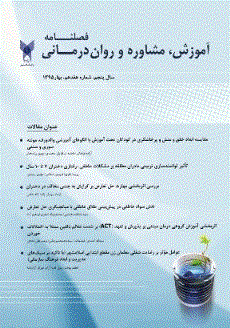بررسی اثربخشی مهارت حل تعارض بر گرایش به جنس مخالف در دختران
محورهای موضوعی : فصلنامه تعالی مشاوره و روان درمانیفرشاد پهلوان زاده 1 * , ژاله رفاهی 2
1 - حفاظت فیزیکی دانشگاه ازاد اسلامی اصفهان
2 - مدیرگروه مشاوره دانشگاه ازاد اسلامی مرودشت
کلید واژه: تعارض, مهارت حل تعارض, گرایش به جنس مخالف,
چکیده مقاله :
هدف پژوهش: امروزه یکی از مسائلی که جوا نان ما را در تضاد و تنش قرار می دهد، چگونگی روابط دختر و پسر با توجه به گرایش های فرهنگی، دینی ، عرفی، اجتماعی و خانوادگی او می باشد. در حالی که در بسیاری از کشورهای جهان آزادی رابطه دختر و پسر مشهود است، نسل جوان ما نمی داند با این موضوع چگونه برخورد کند. این پژوهش با هدف بررسی اثربخشی آموزش مهارت حل تعارض بر گرایش به جنس مخالف دختران مجرد در شهر اصفهان اجرا شد. روش آماری: جامعه آماری شامل کلیه دختران مجرد منظقه 11شهر اصفهان بوده که از این افراد به صورت نمونه گیری دردسترس تعداد 40 نفر از دختران مجرد که به فرهنگسراهای منطقه 11 مراجعه کردند انتخاب و در دو گروه آزمایش و کنترل قرار داده شدند. برای اندازه گیری از پرسشنامه نگرش به جنس مخالف استفاده و بر روی گروه آزمایشی بسته آموزشی مهارت حل تعارض اجرا شد. یافته ها: داده های به دست آمده با روش آماری تحلیل کواریانس تک متغیره تجزیه و تحلیل شد و یافته های به دست آمده نشان داد که بین میانگین دو گروه آزمایش و کنترل تفاوت معناداری وجود دارد (05/0P<). نتیجه گیری: نتیجه کلی به دست آمده بیانگر اینست که آموزش مهارت حل تعارض باعث کاهش گرایش به رابطه با جنس مخالف در دختران شده است.
Abstract Introduction: One of the issues that young people puts us in conflict and tension, relations between girls and boys due to cultural attitudes, religious, secular, social and familial him. While in many countries of the free world is evident boys and girls, our young generation does not know how to deal with this issue. The aim of this study was to investigate the effectiveness of Conflict resolution skills in Tends to be the opposite sex in Single girls in Isfahan city. Method:This study is a quasi experimental design of pretest-posttest control group. The subjects in this study consisted of all Girls Singles have come to the Cultural centers Area 11 isfahan city in the years of 2015. The design of this study was quasi-experimental with control group and two stages of evaluation, included pre test and post test. A total of 40 participants were selected and randomly divided into two experimental(20) and control(20). Experimental group got a 9- session intervention based on Conflict resolution skills, weekly; while control group didn,t get any intervention Each group responded to Applied tools were Tends to be the opposite sex questionnaire. Data were analyzed through univariate analysis of covariance. Results: Findings showed that there are significant differences between the experimental and control groups (p<0.05). Conclusion: The results of analysis of covariance showed that Conflict resolution skills decrease of Tends to be the opposite sex.
_||_

